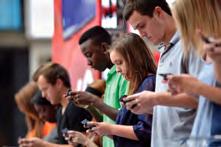
6 minute read
Millennials To Make Up 75% ofglobal workforce. Are companies ready?

49 bizrepublic.com ▶ Millennials To Make Up 75% Of Global Workforce M illennials, or people born between 1981 and 1999, will make up 35% of the workforce next year and it’s estimated that by 2025 they will make up 75% of the workforce worldwide, according to consultants such as Deloitte, Randstad and others with global presence. Therefore, it is important to have an in depth understanding of these digital-savvy, free and purposeful-by-nature people that demand not only good pay from companies, but also positive corporate cultures such as diversity and inclusion (it’s no small fact that 43% of American millennials are non-caucasion); they also require flexibility. Millennials lead in the use of mobile devices and the Internet, tools that have allowed them to be classified as excellent collaborators, prosumers, making them versatile and innovative. They have grown up believing that they can change the world and can’t support working more than two years at the same job unless companies adapt to their multiple demands, which doesn’t always happen. Thanks to their energy, creativity and passion to deal with problems inherited from previous generations, young millennials develop powerful adaptation and transformation skills. Below, we present a series of data and characteristics that can be useful for entrepreneurs and companies interested in learning to ‘deal’ with millennials, not only as employees, but also as potential suppliers, consumers and customers. Because if the young adults of Generation Y will make up no less than three quarters of the world’s working population in about five years, it would be better to be prepared to leave behind ‘old school’ habits and do a reengineering of your business to appeal to them as workers and consumers as these citizens are taking control of things in full development of industry 4.0. DIGITAL PAYMENTS In 2025, millennials will be the generation with the highest earnings in history, which will change the banking industry. This is one of the conclusions of an article published in Nasdaq by the digital payment platform Due.com, which predicts that the growing influence of the generation of those born in the 80s will revolutionize the economic sector, giving the first steps towards a society without cash. In the United States, 8 out of 10 millennials make all their purchases and pay their bills from their cell phones. One of the main reasons is security. TELEWORKING According to a report prepared by Citrix, a multinational entity that provides digital workspaces with more than 100 million users worldwide, it is well known that Generation Y (millennials) have best adapted (74%) to telecommuting or remote work, which allows them to work from a place other than an office. Behind them is Generation X (born between 1965-1979) with 22%, and Baby Boomers (born between 1946 and 1964) with 4%. Millennials are more productive working from where they feel most inspired. NEXTGEN WORK Models of alternative and non-traditional jobs are what millennials are looking for, according to the study “Gig Responsibly: the Rise of NextGen Work”, prepared by ManpowerGroup. According to the analysis, 95% of Generation Y respondents prefer these types of jobs because it allows them to balance their personal lives, income and professional growth. NextGen Work is a global phenomenon and is positive from the perspective of a worker and the employer. These jobs allow millennials to earn more money and learn new skills. CRYPTOCURRENCY A research survey by YouGov Omnibus revealed that 48% of US millennials are interested in converting their economy mainly to cryptocurrencies, and set aside the dollar. Bitcoin, the largest cryptocurrency that currently accounts for more than half of the total market, is also the most popular among the young adults of Generation Y. According to the study, 44% of millennials believe that cryptocurrencies will see widespread adoption and will be accepted as a means for legal purchases in the next decade. SHARING ECONOMY Jilian Mincer wrote in Reuters that millennials put less emphasis on owning and more on sharing, trading and exchanging to obtain assets or services. These behaviors, typical of the sharing economy, have boosted businesses such as Zipcar car rental service, Uber taxi service and the Airbnb home rental Useful information for business owners and companies to learn to ‘deal’ with Generation Y.
Advertisement


...ARE COMPANIES READY?
site. For Rachel Botsman, author of “Who can you trust?”, Generation Y “is moving from a culture of ‘me’ to a culture of ‘we’.” For millennials, buying items doesn’t have the same value it had for their parents and grandparents.
DIGIMANUFACTURING A high percentage of millennials don’t want to work in factories or pursue a trade, although manufacturers in the United States struggle to hire them and replace baby boomers, the aging workforce. In the next decade there will be 3.4 million vacancies in manufacturing jobs and many of them will be ‘digimanufacturing’, which is advanced manufacturing, highly automated and determined by data. Presenting this opportunity to millennials is still a work in progress. As long as the factories can’t make their jobs look great, they won’t attract millennials.
INSURANCE According to a survey of more than 8,000 consumers worldwide, conducted by MuleSoft Inc., of Salesforce. com, 62% of millennials would be willing to allow insurance companies to access their Facebook, applications and smart device data in exchange for a reduction in their premiums. Insurers invest millions to improve their digital offerings amid stiff competition from emerging financial-technology companies. 56% of respondents said they would change their insurance provider if the digital service were not good.
survey conducted by consultant agency Robert Half International showed that 61% of young people accepted the salary offered by a company, whatever the amount, without negotiating further. While only 39% asked for more money after having received a job offer. According to Payscale, the salary search and comparison tool, only 37% of millennials asked for a raise from their employer because they didn’t want to be perceived as ambitious and feel uncomfortable with the negotiation process.
MILLENNIAL MANAGERS According to a survey of 4,000 private sector employees done by the consulting firm specialized in executive recruiting, PageGroup, 45% said they were in favor of being led or having a millennial boss. Contrary to widespread belief, millennials, far from being resisted, gain more and more sympathizers among employees of all generations to fill positions that involve management. However, according to the Deloitte Millennial Survey (2018), only 6% of millennials have managerial positions.
ASIAN MILLENNIALS Almost 60% of the world’s millennials live in Asia. China has 400 million millennials, 5 times that of the United States and totaling more than the entire American population. Morgan Stanley estimates that India’s 410 million millennials will spend US $330 billion in 2020. On the last Alibaba Singles Day, the online consumption holiday in China, millennials spent US $25 billion. Unlike previous generations, known for their savings and forecasting skills, Chinese millennials have taken pleasure in spending money.
MILLENNIAL RETIREMENT The World Economic Forum has predicted that by 2050, when millennials from the eight major pension markets begin to withdraw, the retirement savings gap will be US $427 billion. That is almost six times the 2015 figure, which was US $67 billion. Among the causes contributing to this huge gap are greater life expectancy, the slowdown in long-term growth, and very low savings rates. Do millennials believe that saving for retirement is boring? There are surveys that indicate that they do.
BEST AND WORST Using 36 metrics divided into five key dimensions (affordability, education and health, quality of life, economic health and civic engagement), personal finance site WalletHub determined that Massachusetts is the best US State for millennials in 2019, followed by District of Columbia (Washington DC) and the States of Washington, Minnesota, Wisconsin, Colorado, Iowa, Utah, Pennsylvania and California. While West Virginia was considered the worst State for millennials, followed by New Mexico, Mississippi, Oklahoma, Louisiana, Arkansas, Nevada, Kentucky, South Carolina and Alabama











